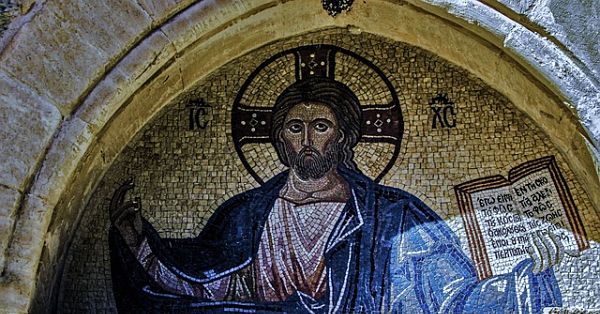Who Is God?
On Youtube one can see a series of portions of an interview of theologian Jürgen Moltmann by his former student, theologian Miroslav Volf. In one segment of the interview Volf asks Moltmann “Who is God?” Moltmann’s immediate reply is “Jesus.” He goes on to say that if it were not for Jesus he would not believe in God.
There is probably no single theologian whom I have studied more than Moltmann. I have read almost every book he has written, numerous articles and book chapters by him, and I have published a few articles and book chapters about his theology. Over the years I have met him several times and once had a lengthy dinner conversation with him after moderating a public discussion of his theology (where he was present and even asked me to answer one of the questions for him!).
Moltmann is an unusual theologian; he has never pretended to be a systematic thinker even though certain themes tie all of his works together. He described his books as “experiments in theology” and eschewed systematic or dogmatic theology. There has been much controversy and disagreement about Moltmann’s theology. One critic called him an atheist; another called him an evangelical. His whole theological work has been oriented toward ethics even though he has written much about the Trinity (for example).
In his later years especially it became increasingly clear that Moltmann looks at God through the lens of Jesus. I was not at all surprised to hear him say “Jesus” when asked who God is. His theology has always been both Trinitarian and Christocentric. No one who knows Moltmann’s theology would accuse him of being Christomonistic; the more common criticism is that his doctrine of God is tritheistic and I have to agree that at times he comes close to that. His is most definitely a social doctrine of the Trinity with strong emphasis on the distinction as well as perichoretic interrelatedness of the three persons.
So what could he have meant by “Jesus” (when asked who God is)? I take it that he meant Jesus is the “face” of God for us. Jesus said “If you have seen me, you have seen the Father.” This is not “Jesus Only” theology as in Oneness Pentecostalism; it is simply the assertion that the character of Jesus is the character of God. There is no “hidden God” lurking somewhere behind Jesus who is different from Jesus in terms of disposition, will, character. Jesus is not the Father or the Holy Spirit, but he is the human manifestation of their common triune disposition, will, and character.
*Sidebar: The opinions expressed here are my own (or those of the guest writer); I do not speak for any other person, group or organization; nor do I imply that the opinions expressed here reflect those of any other person, group or organization unless I say so specifically. Before commenting read the entire post and the “Note to commenters” at its end.*
I think this is why Moltmann’s theology has always resonated with me. While I did not grow up in “Oneness Pentecostalism” (we considered them heretics!), I did grow up and was spiritually nurtured in a form of Christianity that elevated Jesus to a special status in terms of our redeemed relationship with God. Many outsiders seem to think that Pentecostal Christians elevate the Holy Spirit over the Father and Jesus, but nothing could be further from the truth—at least in terms of the Pentecostalism I grew up in. We sang and talked endlessly and most passionately about Jesus. Nothing was more important to us than enjoying the personal presence of Jesus in our lives—individually and as a Christian community. We were people of the name of Jesus. We could not imagine attempting to “picture” who God is apart from Jesus. “Jesus, O how sweet the name; Jesus, every day the same. Jesus! Let all saints proclaim his precious name forever.”
I cannot say with Moltmann that if it were not for Jesus I would not believe in God, but I can and will say that if it were not for Jesus I would only fear God. I think monotheism is more rational than any alternative worldview. (And by “monotheism” here I do not mean what Moltmann means when he criticizes it. When he criticizes monotheism he means monarchianism. For him the Trinity is the Christian alternative to monarchial monotheism.) If it were not for Jesus I would believe in God rationally; I would probably be a deist. Because of Jesus I know God to be loving, compassionate, just, forgiving, and liberating.
I must add here, of course, that Jews also believe God is loving, compassionate, just, forgiving, and liberating. All I’m saying is that if it were not for Jesus I would not think of God as having that character.
I have to wonder if that is really what Moltmann means, too. I suspect and hope so.
*Note to commenters: This blog is not a discussion board; please respond with a question or comment only to me. If you do not share my evangelical Christian perspective (very broadly defined), feel free to ask a question for clarification, but know that this is not a space for debating incommensurate perspectives/worldviews. In any case, know that there is no guarantee that your question or comment will be posted by the moderator or answered by the writer. If you hope for your question or comment to appear here and be answered or responded to, make sure it is civil, respectful, and “on topic.” Do not comment if you have not read the entire post and do not misrepresent what it says. Keep any comment (including questions) to minimal length; do not post essays, sermons or testimonies here. Do not post links to internet sites here. This is a space for expressions of the blogger’s (or guest writers’) opinions and constructive dialogue among evangelical Christians (very broadly defined).













